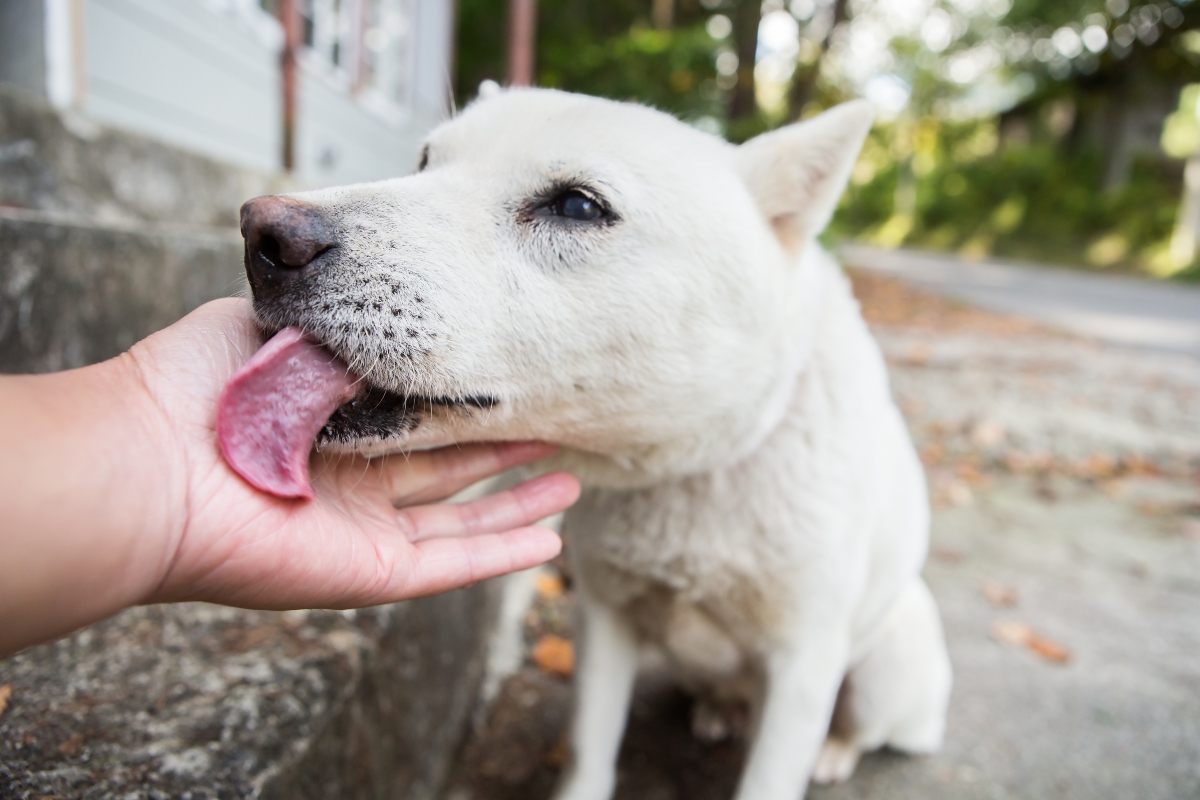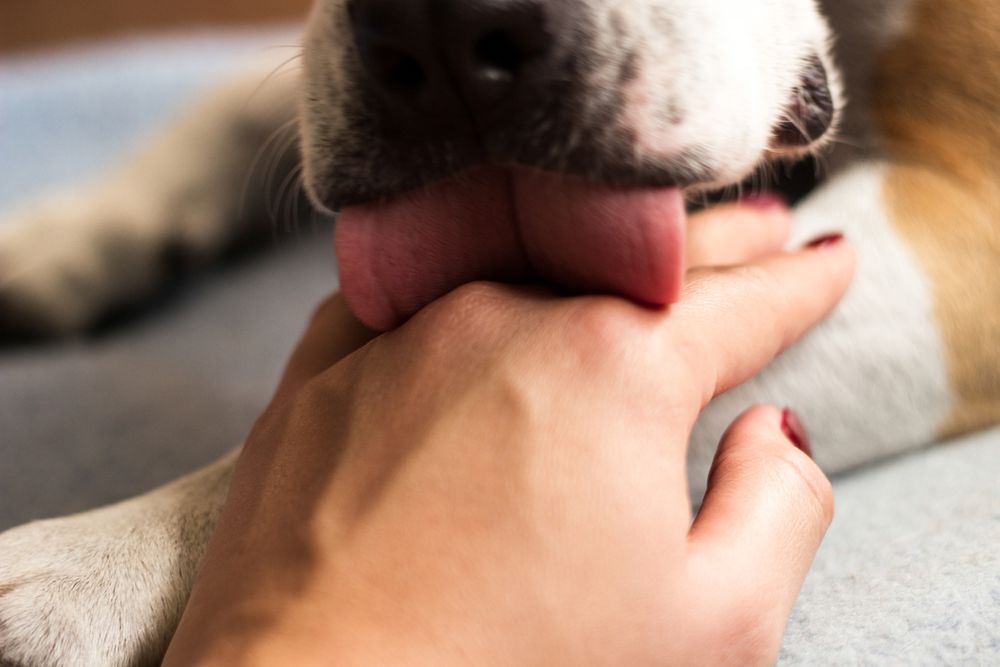Dogs are fascinating creatures, often leaving us puzzled by their behaviors. One such behavior that many dog owners encounter is their furry friend licking their hands. While this behavior may seem simple on the surface, it can actually signify a variety of emotions and intentions on the part of the dog. In this comprehensive guide, we’ll delve deep into the reasons why dogs lick your hand and what it means for your canine companion.
Understanding Canine Communication Through Licking

The Affectionate Lick
Dogs are social animals with a strong inclination towards forming bonds with their human family members. One of the most common reasons why dogs lick their owner’s hands is to express affection and strengthen the bond between them. This affectionate licking behavior is deeply ingrained in canine social behavior and is reminiscent of how dogs interact with each other within their packs.
When a dog licks your hand in an affectionate manner, it’s often accompanied by other signs of happiness and attachment, such as wagging tails, relaxed body language, and perhaps even a gentle nuzzle. This gesture communicates the dog’s desire to be close to you and to demonstrate their loyalty and affection.
Communication and Interaction
Licking can also serve as a form of communication between dogs and their owners. Dogs are highly attuned to human behavior and emotions, and they may lick your hand in response to various cues or situations. For example, if you’ve been away from home for a while and return, your dog may greet you with enthusiastic licking as a way of expressing their joy and excitement at your return.
Similarly, if your dog senses that you’re feeling stressed, anxious, or upset, they may lick your hand as a gesture of comfort and reassurance. Dogs have a remarkable ability to empathize with their owners and may use licking as a way to provide emotional support during times of distress.
Establishing Trust and Connection
In addition to expressing affection and offering comfort, licking can also play a role in establishing trust and connection between dogs and their owners. By engaging in this behavior, dogs demonstrate their trust in you and their willingness to engage in mutual grooming and bonding activities.
For puppies, licking is often a way of seeking guidance and approval from their human caregivers. By licking your hand, a puppy may be signaling their desire to learn from you and to form a strong bond based on trust and respect.
Responding to Human Cues
Dogs are highly responsive to human cues and may adjust their behavior based on your reactions and responses. If you respond positively to your dog’s licking by offering affection or attention, they may interpret this as a sign of approval and continue to engage in the behavior.
Conversely, if you discourage or ignore your dog’s licking, they may learn to associate this behavior with negative consequences and may eventually decrease or stop the behavior altogether. By being mindful of your reactions and setting clear boundaries, you can effectively communicate with your dog and reinforce desirable behaviors while discouraging unwanted ones.
Exploring the Motivations Behind Hand Licking

Sensory Stimulation
Dogs experience the world primarily through their senses, and licking is no exception. When a dog licks your hand, they are not only exploring the taste and texture of your skin but also seeking sensory stimulation. Dogs possess a highly developed sense of smell, and they may be drawn to the scents present on your skin, whether it’s remnants of food, sweat, or other odors. Additionally, the act of licking provides dogs with tactile feedback, allowing them to gather information about their environment and their interactions with humans.
Comfort and Soothing
Licking can also serve as a self-soothing mechanism for dogs, particularly in times of stress, anxiety, or discomfort. Similar to how humans engage in comforting behaviors like hugging or self-soothing gestures, dogs may turn to licking as a way to alleviate their emotional distress. The repetitive motion of licking can release endorphins in the dog’s brain, providing a temporary sense of relief and relaxation. In some cases, dogs may seek out their owner’s hand specifically for comfort and reassurance, relying on the familiar scent and presence of their human companion to provide solace during challenging times.
Behavioral Reinforcement
For some dogs, licking behavior may be reinforced through positive associations and rewards. If a dog receives attention, affection, or treats from their owner in response to licking, they may learn to associate this behavior with desirable outcomes and continue to engage in it as a means of seeking attention or affection. Similarly, if a dog finds licking to be inherently enjoyable or satisfying, they may engage in the behavior simply for the pleasure it brings them, regardless of external rewards.
Curiosity and Exploration
Dogs are naturally curious creatures, and they often use their mouths and tongues to explore their surroundings. When a dog licks your hand, they may be motivated by a sense of curiosity about the various scents, tastes, and textures present on your skin. Dogs rely heavily on their sense of taste and smell to gather information about their environment, and licking allows them to gather valuable sensory information about their human companions.
Social Interaction and Bonding
Licking can also play a role in social interaction and bonding between dogs and their owners. Dogs are social animals with a strong need for companionship and interaction, and licking serves as a means of communication and bonding within the human-canine relationship. When a dog licks your hand, they may be seeking to strengthen the bond between you, express affection, or engage in mutual grooming behaviors reminiscent of their interactions with other dogs.
Addressing Concerns and Preferences

Hygiene Considerations
One of the primary concerns associated with dogs licking your hand is hygiene. Dogs explore the world with their mouths, and their saliva can contain bacteria and pathogens that may pose health risks to humans. Additionally, dogs may lick surfaces or objects that are dirty or contaminated, further raising concerns about hygiene and cleanliness.
For some dog owners, the idea of their dog licking their hand may be off-putting or unhygienic, particularly if they are concerned about the transmission of germs or bacteria. This concern may be heightened in households with young children, elderly individuals, or individuals with compromised immune systems who may be more susceptible to illness.
Personal Preferences
In addition to hygiene considerations, personal preferences also play a significant role in how dog owners perceive and respond to hand licking behavior. While some dog owners may enjoy the affectionate gesture of their dog licking their hand and see it as a bonding experience, others may find it unpleasant or uncomfortable.
Personal preferences regarding hand licking may be influenced by cultural norms, past experiences, or individual sensitivities. For example, some individuals may have a strong aversion to saliva or may simply prefer not to have their hands licked by their dog due to personal boundaries or preferences.
Managing and Redirecting Hand Licking Behavior

Understanding the Root Cause
The first step in addressing hand licking behavior is to understand the underlying motivation behind it. Is your dog licking your hand out of affection, seeking attention, or experiencing anxiety or discomfort? By observing your dog’s behavior and paying attention to the context in which licking occurs, you can gain valuable insights into the root cause of the behavior.
If your dog is licking your hand as a form of affection or attention-seeking behavior, you may need to establish boundaries and provide alternative forms of interaction. If the licking is driven by anxiety or discomfort, it’s essential to address the underlying issues and provide your dog with the support and reassurance they need.
Providing Alternatives
Once you understand the root cause of your dog’s hand licking behavior, you can provide alternative outlets for their natural instincts. Offering chew toys, puzzle feeders, or interactive games can redirect your dog’s attention away from hand licking and provide them with mental and physical stimulation. These alternative activities can satisfy your dog’s need for oral stimulation and exploration in a more appropriate manner.
Training and Reinforcement
Positive reinforcement training techniques can be highly effective in redirecting hand licking behavior. By rewarding your dog for engaging in alternative behaviors, such as sitting calmly or offering a paw, you can encourage them to choose these behaviors over hand licking. Consistency and patience are key when implementing training techniques, as it may take time for your dog to learn and adjust their behavior.
When your dog licks your hand, calmly redirect their attention to a more appropriate behavior, such as sitting or lying down. Reward them with praise, treats, or affection when they engage in the desired behavior, reinforcing the connection between the behavior and the reward. Over time, your dog will learn that engaging in alternative behaviors results in positive outcomes, leading to a decrease in hand licking behavior.
Setting Boundaries
Establishing clear boundaries is essential for managing hand licking behavior effectively. Communicate your expectations to your dog in a calm and consistent manner, and enforce these boundaries consistently. If your dog persists in licking your hand despite redirection and training efforts, gently remove your hand and withhold attention until they calm down. This teaches your dog that hand licking is not an acceptable behavior and encourages them to engage in more appropriate forms of interaction.
Conclusion
Understanding why dogs lick your hand provides valuable insight into canine behavior and communication. Whether motivated by affection, curiosity, or comfort, hand licking serves as a multifaceted means of interaction between dogs and their owners. By recognizing the various motivations behind this behavior and implementing appropriate management strategies, dog owners can foster positive relationships with their canine companions while maintaining hygiene and respecting personal preferences.

